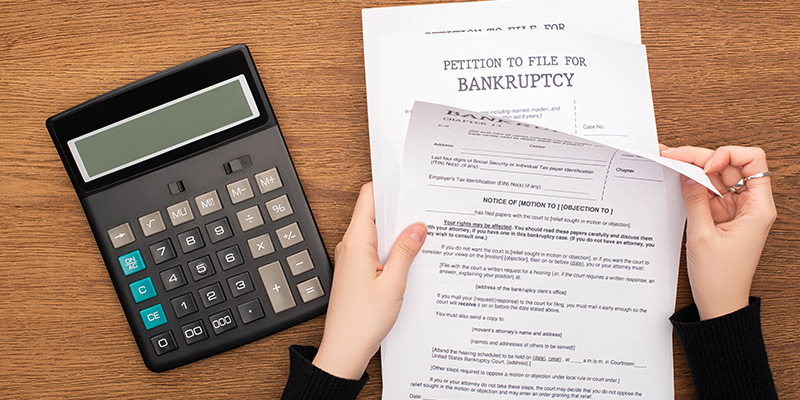Chapter 7 bankruptcy, also known as straight bankruptcy or liquidation bankruptcy, is a legal process designed to help individuals wipe out their unsecured debts and get a fresh start with their finances. A liquidation plan is created, the individual’s nonexempt property gets sold, and the proceeds are used to service existing debts. A judge then orders all remaining debts to be discharged.
Although it’s the most common type of bankruptcy in the U.S., declaring Chapter 7 bankruptcy is no minor decision. But it just may be the right one for you, especially if you cannot see any way of paying off your debt in the next five years. Bankruptcy is a powerful tool in the event that your debt burden becomes unmanageable, and if you commit to rebuilding your credit afterward, it can be one of the best financial decisions you’ll ever make.
But you don’t have to make the decision alone. Gather as much information as you can, then consult an experienced bankruptcy attorney, like ours at OlsenDaines, so you can be sure you understand all of the ramifications of your decision.
There are many missteps you should plan to avoid in the months and weeks leading up to filing. For starters – before you can file for bankruptcy you must complete mandatory pre-bankruptcy credit counseling and receive a certificate.
What to Expect in Pre-Bankruptcy Credit Counseling
The purpose of pre-bankruptcy credit counseling is to provide an impartial look at whether or not a debtor really needs to file for bankruptcy. The most important thing to remember is that you must complete the counseling before you file for bankruptcy. Upon completion, you will receive a certificate that is valid for 180 days. If you decide to file for bankruptcy, you will need to file that certificate with the court.
Pre-bankruptcy credit counseling may be the most painless part of bankruptcy. It can be done in person, by phone, or online, and it usually takes no more than a couple of hours.
Once you have completed the counseling and have your certificate, you must file it with the court along with your other bankruptcy forms. Credit counseling is mandatory. If you do not file a certificate of credit counseling with the court, the bankruptcy court will dismiss your case.
For your counseling session, you will want to bring (or have available) information about your debts and your income. The counselor will discuss your financial situation with you and will talk to you about what non-bankruptcy options you may have. Counseling will most likely include:
- A thorough review of your personal finances
- A discussion of alternatives to bankruptcy
- Personal budget plan.
Overall, this counseling will help you to understand how bankruptcy works and what you can do to avoid financial risk in the future.
Should I Stop Paying Creditors If I’m Going to File for Bankruptcy?
The short answer is, no you shouldn’t stop paying creditors until you’ve officially filed. When you file for bankruptcy, the court will order an automatic stay which will prohibit lenders from making harassing collection calls, sending threatening letters, and trying to file lawsuits against you. But until then, they can continue to harass you so don’t be surprised if you suddenly stop making payments.
In most cases, the automatic stay remains in effect until your bankruptcy case is concluded. Keep in mind that it won’t stop every debt collector. Automatic stay orders will not halt child support, loans against your pension, or back taxes. And if you filed for bankruptcy in the previous year, the order will expire after 30 days.
- Auto Loans: If you stop making payments on your auto loan, the creditor will eventually attempt to repossess your vehicle. If you want to keep the vehicle, you may want to continue making payments so you don’t run the risk of having it repossessed.
- Credit Cards: In most cases, people are fine not making their credit card payments, but you will likely be subjected to collection calls until you file for bankruptcy. If you just used a card before you realized you were going to file, you may want to continue to make payments. We recommend consulting with a bankruptcy attorney.
- Home Loans: As with auto loans, if you stop making your mortgage payments, at some point the creditor will attempt to foreclose the home. If you want to keep it, you may want to continue making your monthly payments. Every case is different.
If you’ve taken out loans through your bank or credit union and you’ve stopped making payments, they can institute a setoff. This allows them to withdraw money from one of your accounts to another to cover the loan payment. You may want to move your money around before missing a debt payment.
How Much Does a Bankruptcy Affect Your Credit Score?
As one of the single largest events that can affect your credit score, bankruptcy can drop it by hundreds of points. If your credit score is considered ‘good,’ you will be penalized more heavily than if it is ‘average’ or worse.
So if you have solid credit (700+), your credit score will drop by about 200 points. But if you have below-average to average credit, your score won’t drop as much.
The good news is that the effect is not permanent. In fact, you can start rebuilding credit immediately after bankruptcy is filed. The process takes some time, but financial institutions offer products like secured credit cards and credit-builder loans that can help. Just be sure to make your payments regularly and on time and practice smart spending habits. Financial institutions will look favorably on your efforts to rebuild credit after bankruptcy, even if you have it on your record.
What Factors Affect Your Credit Score?
Credit card payments, mortgage payments, and rent payments are three types of debt that will have the largest impact on your credit score.
The rules around another common type of debt (medical debt) are currently changing as of June 2024, thanks to pressure from the Consumer Financial Protection Bureau (CFPB) and the American Rescue Plan (ARP). Those who are forced to take on medical debt usually have no idea how much their treatments will end up costing.
Do You Still Owe Taxes if You File for Bankruptcy?
Yes, you must pay your taxes (and file extensions if needed) during the bankruptcy process. Filing for bankruptcy is one of the most effective ways to eliminate debt, save your home, and rebuild your financial security. It can also help you sleep easier at night knowing that you won’t have to worry about repossession or mounting bills.
How Do Taxes Work After Bankruptcy?
Many people overlook their tax situation when filing for bankruptcy, but it’s crucial to know what to expect before moving forward with your case. Your tax requirements will look different depending on which type of bankruptcy you are filing for.
Chapter 7 bankruptcy is meant to help those with lower income and fewer assets, and individuals must pass a “means test” in order to qualify. If granted Chapter 7 bankruptcy, individuals will be assigned a trustee who will be responsible for reviewing their petition and seizing any nonexempt assets that can be sold to benefit their creditors.
If you are unable to pay your taxes and accrue new debt, it can negatively impact your case and may even result in your case being dismissed. However, if you are expecting a tax refund but are granted Chapter 7 bankruptcy, then you may need to turn the funds over to your trustee, who will use them to pay your creditors.
Can Bankruptcy Discharge Tax Debt?
Tax debt generally cannot be discharged even if you are granted bankruptcy. Tax debt is considered “unsecured debt.” That said, if your tax debt meets a few specific criteria, you may be able to discharge it when filing for Chapter 7 bankruptcy. Your debt may be considered for discharge if it meets these requirements:
- The tax return filing was due three or more years ago.
- The tax return filing was two or more years ago.
- The tax assessment is at least 240 days old.
- The tax return was not fraudulent.
- The taxpayer did not attempt tax evasion.
What is Bankruptcy Exemption Planning?
Bankruptcy exemption planning is the process of making deliberate choices concerning a debtor’s property before filing bankruptcy, to maximize the exemption protections provided by the bankruptcy law. So one primary way that bankruptcy law attains its goal of providing debtors with a “fresh start” is by providing debtors with certain “exemptions” that protect their property from creditors and put it beyond the reach of the bankruptcy trustee.
Warning: bankruptcy exemption planning can be dangerous. Most people who file for bankruptcy do not lose anything they own because they often file a Chapter 7 bankruptcy and everything they own is “exempt.”
Section 727(a)(2) of the Bankruptcy Code prohibits any debtor who attempts to defraud creditors by transfers of property, from being discharged. So there is tension in the law with regard to how much you are allowed to sell or transfer before filing for bankruptcy.
To properly engage in exemption planning, you will need the advice of an experienced and highly competent bankruptcy attorney to guide you as to the safest way to engage in asset protection and other strategies, and to inform you on which strategies are likely to be safe.
Bankruptcy in the Context of Divorce
Many divorced couples say that conflict over finances caused their marriage to fall apart. Fights over money ruin relationships. That’s why we so often see divorce occur when there is a bankruptcy. It’s because of this that it is critical to understand the intersection of bankruptcy and divorce laws.
What comes first – divorce or bankruptcy? There’s no simple answer. If you are facing divorce and bankruptcy, the first thing you need to consider is timing. You must decide whether to file for divorce first or for bankruptcy first. (Filing the two together causes significantly more problems.) How you answer that question depends on a number of things:
- Your income
- Your spouse’s income
- What assets you possess
- Costs of divorce and bankruptcy
- What type of bankruptcy you are filing for or qualify for
What Type of Bankruptcy to File in Divorce
An important factor to consider is the type of bankruptcy that you should file for. A Chapter 7 bankruptcy requires that you meet the income requirements of the “means test.” If your income compared to certain expenses is too high, you will be required to file for Chapter 13 (“reorganization”) bankruptcy instead.
If your earnings are significantly different from your spouse’s, it might make more sense to file for divorce before you file for bankruptcy. On the other hand, if you earn significantly less than your spouse and you file for bankruptcy individually after the divorce is final, you may have a better chance of qualifying for Chapter 7 bankruptcy.
Although the intersection of bankruptcy and divorce may be common, it is not simple to navigate. But the good news is that you do not need to try to figure all this out on your own. OlsenDaines is here to help.
Before you can make a final decision, you must consider the facts of your situation, the divorce laws, and the bankruptcy laws. That’s why you should sit down with an experienced bankruptcy attorney to discuss your situation and what is best for you.
Is Bankruptcy Right For You? Let OlsenDaines Help You Decide
To achieve your financial goals, it’s best to work with an experienced bankruptcy attorney. OlsenDaines has vast experience with bankruptcy. In fact, we’re the top bankruptcy filer in Oregon & Washington.
Filing for bankruptcy can be overwhelming, but you don’t have to navigate it all alone. The experienced bankruptcy attorneys at OlsenDaines are prepared to help get you through the process as quickly and easily as possible while answering all of your questions.
We have proudly served Oregon & Washington residents for over 46 years and are ready to use our expertise to help you relieve your debt. To get started, schedule your free, no-obligation legal consultation with one of our attorneys today!















